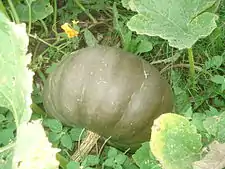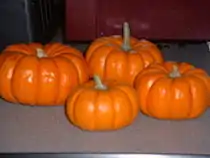ķirbis
Latvian

Ķirbis

Ķirbji
Etymology
Borrowed from German Kürbis, itself borrowed from Latin cucurbita (from an earlier *curbitia, via reduplication). This word is first mentioned in early 18th-century texts, but only in the 19th century did it become really popular and enter the standard literary language. Various expressions had previously been used to refer to this plant, usually comparing it to a cucumber or apple (“big cucumber”, “big apple”, “porridge apple,” “porridge cucumber,” etc.).[1]
Pronunciation
- IPA(key): [cīrbis]
| (file) |
Noun
ķirbis m (2nd declension)
- pumpkin, squash, gourd (plants; fam. Cucurbitaceae)
- paraistais ķirbis ― common pumpkin
- baltais ķirbis ― white gourd
- ziemas ķirbji ― winter squash
- ķirbju sēklas ― pumpkin seeds
- lielaugļu ķirbis ― big-fruited pumpkin, gourd
- krūmu ķirbis ― dwarf (lit. bush) gourd, calabash
- pumpkin, squash, gourd (fruit of the corresponding plants)
- ķirbju zupa ― pumpkin soup
- ķirbju salāti ― pumpkin salad
Declension
Declension of ķirbis (2nd declension)
References
- Karulis, Konstantīns (1992), “ķirbis”, in Latviešu Etimoloģijas Vārdnīca (in Latvian), Rīga: AVOTS, →ISBN
This article is issued from Wiktionary. The text is licensed under Creative Commons - Attribution - Sharealike. Additional terms may apply for the media files.